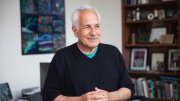Jeff Lichtman, a neuroscientist who is Knowles professor of molecular and cellular biology and Cajal professor of arts and sciences, has been appointed divisional dean of science within the Faculty of Arts and Sciences, effective July 1. Hopi Hoekstra, FAS dean, made the announcement this afternoon. Lichtman succeeds astrophysicist Christopher Stubbs, science dean since 2018, who is stepping down at the end of the academic year; he remains adviser to Hoekstra on artificial intelligence (the subject of his current General Education course).
The appointment fills out Hoekstra’s senior leadership team toward the end of her first academic year leading FAS (Sean Kelly’s appointment as arts and humanities dean was announced on April 17). Her choice perhaps focuses attention on the University’s expanding interest in neuroscience research, including natural and artificial intelligence—the subject of an increasingly interdisciplinary array of scholarship and teaching programs.
In her message to colleagues, Hoekstra pointed to Lichtman’s research efforts to “unravel the mysteries of the brain.” Much as the Human Genome Project catalogued every human gene’s DNA sequence, his lab, she wrote, “seeks to create a ‘connectome,’ or a comprehensive diagram of every neural connection in the brain,” focusing on “the dramatic re-wiring of neural connections that takes place in early postnatal mammalian development, a time when animals are doing most of their learning.” Comparing healthy brains to models of early life stress, autism, or schizophrenia, the researchers hope “to gain broad insights into the circuit basis of mental illness and the physical underpinnings of memory storage.”
In the course of these ambitious inquiries, Lichtman’s lab has partnered with scientists at Princeton, MIT, Cambridge, Johns Hopkins, Columbia, and other universities, and with engineers at Google on image-processing techniques that make sense of large amounts of data quickly, applying artificial intelligence algorithms. He serves as the faculty director of the Harvard Center for Biological Imaging, a light microscopy facility that serves researchers across Harvard and Greater Boston. (“Shedding Light on Life” describes his work in developing the colorful “Brainbow” imaging technique with Tarr professor of molecular and cellular biology Joshua Sanes). Lichtman is also a steering committee member of the Harvard Center for Brain Science, the Harvard Mind, Brain, and Behavior Initiative, and the Harvard Brain Initiative.
In his teaching, Hoekstra noted, Lichtman emphasizes that “communicating complex scientific topics in a clear and compelling way is a skill that can, and should, be learned, right along with the traditional skills at the lab bench.” His faculty service includes his current responsibilities as director of undergraduate studies in neuroscience and chair of the curriculum committee of the department of molecular and cellular biology.
Lichtman was named an arts and sciences professor in 2013, the highest academic honor the FAS bestows. He is a member of the National Academy of Sciences. A graduate of Bowdoin College, he earned M.D. and Ph.D. degrees from Washington University, where he worked for 30 years before coming to Harvard in 2004.
Hoekstra also thanked Stubbs as “an outspoken advocate for the division, a highly effective leader of FAS initiatives from pandemic scenario planning to pedagogical responses to AI, and a generous and collaborative partner to me in my time as dean.”









